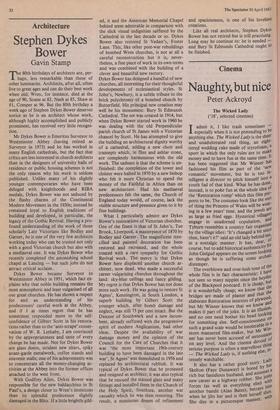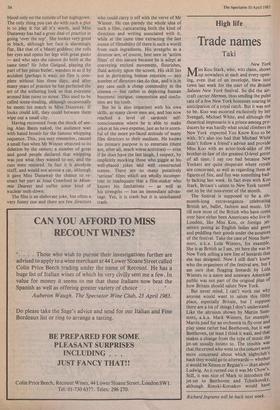Cinema
Naughty, but nice
Peter Ackroyd
The Wicked Lady (`18', selected cinemas) y admit it, I like trash sometimes — .1. especially when it is not pretending to be anything else. The Wicked Lady is the sheer and unadulterated real thing, an eight- tiered wedding cake made of styrofoam, a sport in which the only rules are to make money and to have fun at the same time. It has been suggested that Mr Winner has fashioned his film as part of the 'new romantic' movement, but he is too in- telligent a director to pitch himself into a youth fad of that kind. What he has done, instead, is to poke fun at the whole idea of the 'Restoration romp' which this film pur- ports to be. The costumes look like the sort of thing the Princess of Wales will be wear- ing in a few years' time, and the jewels are as large as fried eggs. Hysterical villagers engage in unadorned copulation, and Tyburn resembles a country fair organise' by the village idiot: 'It's changed a bit since then, hasn't it?' said an old lady behind me:. in a nostalgic manner. It has, dear, course, but to add historical authenticity Sir John Gielgud appears on the screen looking as though he is suffering some archaic distemper.
The overblown and over-lush tone of the
whole film is in fact characteristic: I have not seen so many nipples since the heyday of the Blackpool postcard. It is cheap, but it is wonderfully cheap; we know that the bridges are made of plaster and that the elaborate Restoration interiors of ip ysv000l,, but Mr Winner knows that we know an
°
makes it part of the joke. It is an illusion, and no one need bother his head looking for something else. Self-consciousness on such a grand scale would be intolerable in more mannered film-maker, but Mr Will: ner has never been accused of seriousness t on any level. And the cinema devoid serious purpose is often a marvellous thing — The Wicked Lady is, if nothing else, In- tensely watchable. Lady..
It also has a rather good story.
Skelton (Faye Dunaway) is bored by bei_s rich but fastidious husband, and assumes new career as a highway robber. She .101.11' forces (as well as everything else) Wu_ another bandit (Alan Bates), betrays him when he jilts her and is then herself sh. She dies in a picturesque manner, Ow
blood only on the outside of her nightgown. The only thing you can do with such a plot is to play it for all it's worth, and Miss Dunaway has had a great deal of practice in going 'over the top'. She lookes very good in black, although her face is alarmingly flat, like that of a Maori goddess; she rolls her eyes and opens her legs with great gusto — and who says she cannot do both at the same time? Sir John Gielgud, playing the part of her pious butler, wanders in as if by accident (perhaps it was); no film is com- plete without him these days, and after many years of practice he has perfected the art of the withering look so that everyone around him turns to stone. This used to be called scene-stealing, although occasionally he meets his match in Miss Dunaway. If looks could kill, they could between them wipe out a small city.
Having recovered from the shock of see- ing Alan Bates naked, the audience wait with bated breath for the famous whipping sequence. This, you may remember, caused a small fuss when Mr Winner objected to its deletion by the censor; a number of great and good people declared that whipping was just what they wanted to see, and the cuts were restored. In fact it is anodyne stuff, and would not arouse a cat. although it gave Miss Dunaway the chance to re- enact her part as Joan Crawford in Mom- mie Dearest and suffer some kind of nuclear melt-down.
The film is an elaborate joke, but often a very funny one and there are few. directors
who could carry it off with the verve of Mr Winner. He can parody the whole idea of such a film, caricaturing both the kind of direction and writing associated with it, while at the same time extracting the last ounce of filmability (if there is such a word) from such ingredients. His strengths as a director are, of course, best seen in 'action films' of this nature because he is adept at conveying excited movement, flourishes, fluid activity upon the screen. His skill lies not in portraying human emotion — any number of directors can do that, and it is in any case such a cheap commodity in the cinema — but rather in depicting human busyness: intrigue, commotion and confu- sion are his tools.
But he is also impatient with his own skills, as many clever men are, and has now reached a level of sardonic self- consciousness where he is able to make jokes at his own expense, just as he is scorn- ful of the more po-faced attitude of many film directors to their medium. He knows his primary purpose is to entertain (there are, after all, much worse activities) — even if he does have the last laugh, I suspect, by implicitly mocking those who giggle at his well-placed jokes and well constructed scenes. There are so many putatively `serious' films which are wholly incompe- tent or inadequate that a film-maker who knows his limitations — as well as his strengths — has an immediate advan- tage. Yes, it is trash but it is unashamed trash.











































 Previous page
Previous page